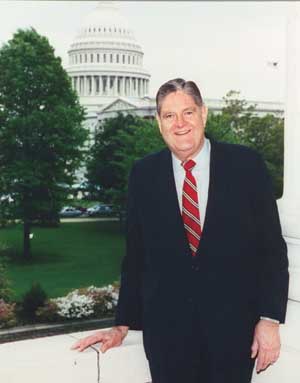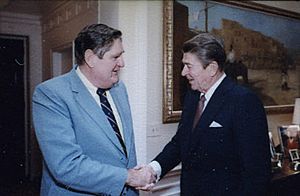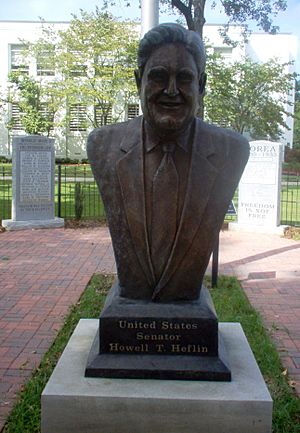Howell Heflin facts for kids
Quick facts for kids
Howell Heflin
|
|
|---|---|
 |
|
| United States Senator from Alabama |
|
| In office January 3, 1979 – January 3, 1997 |
|
| Preceded by | John Sparkman |
| Succeeded by | Jeff Sessions |
| Chair of the Senate Ethics Committee | |
| In office January 3, 1987 – January 3, 1992 |
|
| Preceded by | Ted Stevens |
| Succeeded by | Terry Sanford |
| 24th Chief Justice of the Supreme Court of Alabama |
|
| In office January 19, 1971 – January 17, 1977 |
|
| Preceded by | J. Ed Livingston |
| Succeeded by | C. C. Torbert, Jr. |
| Personal details | |
| Born |
Howell Thomas Heflin
June 19, 1921 Poulan, Georgia, U.S. |
| Died | March 29, 2005 (aged 83) Sheffield, Alabama, U.S. |
| Resting place | Glendale Cemetery Leighton, Alabama, U.S. |
| Nationality | American |
| Political party | Democratic |
| Spouse | Elizabeth Ann Carmichael |
| Relatives |
|
| Alma mater | Birmingham-Southern College (BA) University of Alabama (LLB) |
| Military service | |
| Allegiance | |
| Branch/service | |
| Years of service | 1942–1946 |
| Rank | Major |
| Battles/wars | World War II |
| Awards | |
Howell Thomas Heflin (born June 19, 1921 – died March 29, 2005) was an American lawyer and politician. He was a United States Senator for Alabama from 1979 to 1997. He also served as a judge before becoming a senator.
Contents
Early Life and Military Service
Howell Heflin was born in Poulan, Georgia, on June 19, 1921. He went to public schools in Alabama and finished high school in Leighton. In 1942, he earned his college degree from Birmingham-Southern College in Birmingham. His family had a history in politics. His uncle, James Thomas Heflin, and great-uncle, Robert Stell Heflin, were also involved in government.
During World War II, from 1942 to 1946, Heflin was an officer in the United States Marine Corps. He showed great bravery in battle. He received the Silver Star medal for his courage. He also earned two Purple Heart medals for being wounded in action. He fought in important battles on islands like Bougainville and Guam.
After the war, Heflin studied law at the University of Alabama School of Law. He graduated in 1948. For almost 20 years, he taught law and worked as a lawyer in Tuscumbia, Alabama.
Becoming a Judge
In 1970, Howell Heflin was elected to a very important job. He became the Chief Justice of the Alabama Supreme Court. This means he was the main judge for the highest court in Alabama. He served in this role from 1971 to 1977.
Serving in the Senate
In 1978, Heflin was elected to the United States Senate. He represented the state of Alabama. He took the place of Senator John Sparkman. Heflin won his first Senate election without a Republican opponent.
As a senator, Heflin worked on many important issues. In 1981, after an attempt to harm President Ronald Reagan, Heflin spoke about the need for faster trials. He believed that delays in the justice system made people lose respect for it. He wanted the Senate to work together to fight crime more effectively.
Heflin also suggested creating a national court of appeals. This new court would help the Supreme Court with its heavy workload. It would also help solve disagreements between different federal courts.
Heflin was re-elected to the Senate two more times. He won his second term in 1984 and his third term in 1990. He decided not to run for re-election in 1996. Jeff Sessions then took his place in the Senate.
While in the Senate, Heflin was part of the Senate Judiciary Committee. This committee reviews people nominated to become judges. He also became the chairman of the U.S. Senate Select Committee on Ethics. This committee looks into whether senators follow the rules.
Heflin supported some ideas that were popular with his party. He voted against the North American Free Trade Agreement (NAFTA). He also supported laws that help ensure fair treatment for all people. He voted against confirming Clarence Thomas to the Supreme Court. He felt Thomas did not have enough experience for the job.
In 1993, Senator Heflin gave a powerful speech. He supported Senator Carol Moseley Braun's effort to stop a Confederate Flag design from being renewed. He spoke about his respect for his ancestors and his conflict in disagreeing with some groups on this issue.
Howell Heflin lived in Tuscumbia, Alabama, until he passed away on March 29, 2005. He died from a heart attack. He was a mentor to Doug Jones, who later became a senator for Alabama. Jones took office exactly 21 years after Heflin left the Senate.
Honors and Legacy
Many places and things have been named in honor of Howell Heflin. The University of Alabama School of Law has a "Howell Heflin Conference Room." A street in Tuscumbia is called "Howell Heflin Lane." The Howell Heflin Lock and Dam in Alabama is also named after him. Birmingham-Southern College has the Howell T. Heflin Seminar room in its library.
The New York Times newspaper once called him the "conscience of the Senate." This shows that he was seen as someone who always tried to do what was right.
See also
 | Leon Lynch |
 | Milton P. Webster |
 | Ferdinand Smith |



